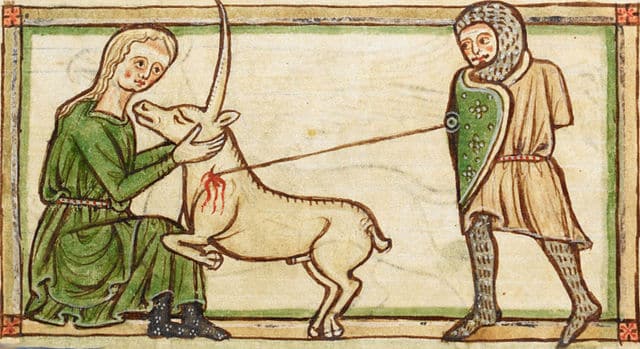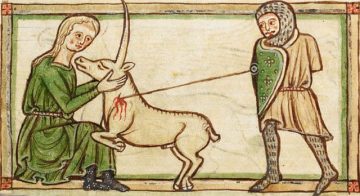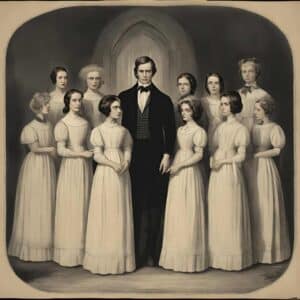Recently, I was feeling discouraged about my investment of time and energy in writing about the intersection of Mormonism and feminism. Did any of this make any difference for good? Was I just rehashing painful topics in ways that hurt me and others?
While was mopping the floor, I listened to a favorite BBC podcast, In Our Time. The next episode on my list was about unicorns. As I listened, I was struck that in the ancient world and the Middle Ages, the unicorn was not a gentle creature. “It’s a fierce animal, and it will defend its young to the death–you cannot take it alive” explained one of the earliest individuals to describe it in the 4th century. Male warriors could not tame or capture the unicorn without female help. It had extraordinary strength and power. It was believed its horn could neutralize poison, purify water that was unsafe to drink, and be used to treat disease.
This wasn’t the end of unicorns showing up in my day. While on a walk, I noticed a teenage girl walking ahead of me wearing a purple sports jersey. In place of a last name on the back of her shoulders was “UNICORN.” A couple hours later, my son approached me while I was preparing dinner. He grabbed my cheeks with his twelve-year-old hands, brought his face close to mine with his eyes open extra wide, and in his best whinnying baby unicorn voice, exclaimed, “unicorn power forever!”
My son had never done this before and couldn’t explain why he did it then. I asked myself, why is this happening to me today? I chose to treat the synchronicities as an affirmation that my honest, fearless criticisms and thoughts as a writer matter. A message during a moment of doubt that being an advocate for girls and women across the Mormon spectrum can do good in the world. And that perhaps it really is my path to take this work and power up “for ever.” Women like me might be rare or strange. Not everyone sticks on the edge of Mormonism, and I respect and completely understand that. And most people aren’t willing to stick their necks out on feminist publications for good reasons. But here I’ve joined the forces of Exponent II, working among some of the most uncensored female voices on Mormonism. The unicorn synchronicity felt like an invitation to trust that there is indeed healing and cleansing power in the words of untameable and fearless “unicorn” women like myself.
I did not notice synchronicities like this until recently after a close friend shared her story about an uncanny coincidence she experienced after asking God for guidance. I learned more about the beneficial practice of noticing and responding to spiritual synchronicities by reading Carol Lynn Pearson’s Embracing Coincidence, and this thoughtful essay by Martha Beck. Spiritual experiences can sometimes be hard to come by, especially when we’re discouraged, but noticing what words, images, ideas, or objects show up in a meaningful way in our lives is something we can always engage. I’m finding synchronicities that help me surmount waves of discouragement as a independent-thinking Mormon feminist keep coming. I don’t know how they happen, but they help me feel oriented toward God, the natural world, trust in myself, and my personal spiritual purpose. I’ll share one more that pertains specifically to my writing for Exponent II.
The day after I posted “The Insidious Exchange of Community for Covenants,” I was walking in the woods. I saw a Cooper’s Hawk in a tree right off the path. It was not very high up and I could watch its movements fairly up close and it didn’t seem bothered by me. During hundreds of walks on Mount Royal, this is the one and only time I’ve seen a hawk. They are very secretive and avoid humans. Hawks can represent courage, power, strength, and clear vision. Their sight is 2-3 times sharper than ours. Seeing the hawk felt like an affirmation that I was using my discernment in a pertinent, courageous, and impactful way. I felt encouraged to keep going, to keep observing and pursuing ideas. Like the unicorn as a symbol, the hawk suggested a kind of fearless ferocity and wildness in my choice to write and share. Hawks are the terrors of the mountain among other birds. Feminist voices are troubling and fearful to some, but they are also a much needed part of the proper eco-system and balance needed in any society. This is especially the case in the Church, in which member feedback and criticism are discouraged and deflected, and in which women and ordinary members don’t have much decision making power at all. Sharp-eyed and determined women capable of finding and scooping up the prey of harmful and unsound practices, teachings and policies are very much part of what God and heaven need in the Church.
For me, Mormon feminist writing comes with waves of discouragement as well as moments of stillness, joy, and healing. I know more challenging waves will head my way as long as I am engaged in this work. But I trust that encouragement and moments of affirmation and transcendence will continue to come also.
Recently, when I was about the publish my posts comparing Joseph Smith’s polygamy to Jack Skellington’s misguided scheme, I was afraid of the trolling, criticism that could come, and also that my words could harm someone else–not because of my own intentions, but simply because the historical truths about Joseph’s plural marriage ideas and practices are ugly and hard. But the night after the second post went up as I knelt down to pray, I felt unprecedented, utter peace. I felt peace about Joseph Smith. In fact, my personal anger and resentment toward him (which I avoided bringing into my essay, and which was caused by my suffering spiritual abuse as a child at the hands of others who were justified by his legacy of plural marriage teachings and practices) seemed to be actively leaving my heart. I don’t forgive abuse easily, and I did not expect to experience such a miracle. I felt immense joy in what I had crafted and shared to help bring understanding, healing, and peace to others. It seemed that heaven and individuals in the spirit world accepted my effort to shed light and truth with the desire to help others.
It was as if during the year when I worked on and off on that essay, I had been drinking my own mini bitter cup, feeling pains and dissonance similar to what thousands of others have known while trying to stave off future suffering and darkness for both myself and others. I had a strong feeling that night that a stage of the shared suffering I had taken upon myself had been duly finished. The wave of discouragement, anguish, and doubt had passed and I could access greater peace again, even about the unpleasant area I’d been tackling. I had a sense I had never had before that Mormon feminist writing is a sacred redemptive work that heals souls and can even heal and redeem the bleeding wounds and sharp edges of our struggling faith tradition.
This is just my perspective, and of course it is not necessarily what Mormon feminist writing needs to mean for others at Exponent, but I thought it could be meaningful to others share what I perceive as the spiritual significance of what my work, and what I am experiencing spiritually as I start on the path of a Mormon feminist writer.






2 Responses
I feel so similarly to you about writing on the topic of Mormon feminism. (I didn’t get a hawk, though. I’d like to file my belated request with the universe for my own sign. 😅)
It feels like a spiritual practice to me, and it’s very emotionally healing. I always want more Mormons to write (especially women and gender minorities) and share their perspectives that are lacking in spaces like general conference and Sunday School manuals. I know there is brilliance out there inside of people still, waiting to be heard.
Thanks, Abby! I’m glad this resonated with you. I hadn’t framed feminist writing as a spiritual practice but that rings true for me too. It’s hard work, it is a labor of love. It’s something we turn to regularly. It can be an offering to God. I don’t always feel the desire to study the scriptures, etc. but the urge to write is much stronger in this stage of life. I learn and grow spiritually as I write and develop ideas. I also feel the desire to help other women be encouraged to write and get involved in Mormon Letters, not only because we need more people involved to help us, but also because I know it will help them grow and gain anazing skills and have more joy and connection.